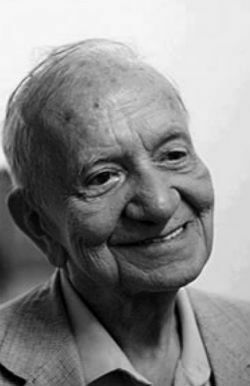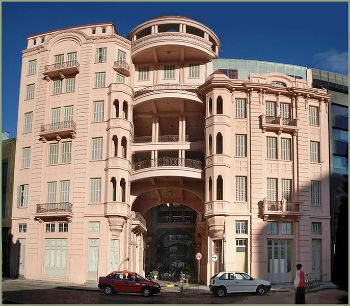Mario Quintana, known as the “poet of simple things”, was a Brazilian modernist writer, journalist and translator. He is considered one of the greatest poets of the 20th century.
In 1980, Mario received the “Prêmio Machado de Assis” from the Brazilian Academy of Letters (ABL). The following year, the poet received the “Jabuti Prize” for Literary Personality of the Year.
Biography

Mario de Miranda Quintana was born in Alegrete, Rio Grande do Sul, on July 30, 1906. He was the son of pharmacist Celso de Oliveira Quintana and Virgínia de Miranda Quintana.
He lived his childhood in his hometown, where he began his studies at the Mixed Elementary School of Dona Mimi Contino.
At the age of 13, he moved to the state capital, Porto Alegre. There, he studied at the “Colégio Militar de Porto Alegre” boarding school.
From adolescence, Mario began to write. Already in the school magazine he published his first works.
For a few months, he worked at the publisher and bookstore "O Globo". He even worked in his father's pharmacy.
Later, he worked as a journalist and collaborator in the State of Rio Grande, Diário de Notícias de Porto Alegre, Revista do Globo and Correio do Povo.
In addition to being a journalist, he worked as a translator, translating many works by renowned writers: Proust, Balzac, Virginia Woolf, Maupassant, Voltaire, among others.
In 1926, his mother died, and the following year, his father. He continued his work in newspapers and as a literate.
In 1930, he moved to Rio de Janeiro as a volunteer with the "Seventh Batalhão de Caçadores de Porto Alegre".
He stayed in the wonderful city for only 6 months, returning to Rio Grande do Sul where he stayed the rest of his life.
Mario didn't get married and didn't have children. He lived most of his life in hotel rooms.
The place where he lived for about 15 years in Porto Alegre, called “Hotel Majestic”, is currently a cultural center called “Casa de Cultura Mario Quintana”.
He died in Porto Alegre on May 5, 1994, a victim of heart and respiratory problems.
 Former Majestic Hotel, Porto Alegre
Former Majestic Hotel, Porto Alegre
Fun Facts: Did You Know?
Maria Quintana competed three times for the position of literate at the Brazilian Academy of Letters (ABL), but never managed to win. Invited to run for the fourth time, the poet refused.
Construction
The language Quintana uses in her texts is simple, fluid, introspective and often ironic. Themes like love, weather, nature are the poet's favorites.
Mario was an avid reader and writer. He wrote poetic works, in addition to works for children and young people, the main ones being:
- Rua dos Cataventos (1940)
- Songs (1945)
- Flower Shoe (1947)
- Magic Mirror (1951)
- Batalhão das Letras (1948)
- The Sorcerer's Apprentice (1950)
- Poetry (1962)
- Pestle Foot (1968)
- Quintanars (1976)
- Hiding Places of Time (1980)
- New Poetic Anthology (1982)
- Glass Nose (1984)
- Chest of Amazements (1986)
- Travel Arrangements (1987)
- Deathless wake (1990)
Want to know more about the topic? Read the articles:
- Poetry of 30
- The Language of Modernism
- Modernism in Brazil
poems
Below are some of Mario Quintana's best known poems.
Rua dos Cataventos
The first time they murdered me,
I lost a way of smiling I had.
Then, every time they killed me,
They took something from me.
Today, of my corpses I am
The most naked, the one that has nothing left.
A yellowish candle stub burns,
As the only good that was left to me.
Come! Crows, jackals, highwaymen!
Because from that greedy hand hooks
They will not rip the holy light!
Birds of the night! Horror wings! Fly!
May the flickering light and sad as a woe,
A dead man's light never goes out!
the poems
The poems are birds that arrive
no one knows where and land
in the book you read.
When you close the book, they take flight
like a trapdoor.
they have no landing
no port
feed for a moment on each pair of hands
and depart. And look, then, at these empty hands of yours,
in the amazed amazement of knowing
that their food was already in you…
Contra Poeminho
All those who are there
obstructing my path,
They will pass...
I bird!
TIC Tac
That ticking of the clocks
is the sewing machine of Time
to manufacture shrouds.
Age
Before, all paths went.
Now all paths come
The house is welcoming, books are few.
And I make tea for the ghosts myself.
Clock
The fiercest of domestic animals
is the wall clock:
I know one who has already devoured
three generations of my family.
Autumn Hai-Kai
A yellow butterfly?
Or a dry leaf
That it came off and didn't want to land?
Sentences
- “Friendship is a love that never dies.”
- “So good to die of love... and keep living.”
- “Indifference is the most polite way to despise someone.”
- “The true illiterate is the one who knows how to read, but does not read.”
- “Do not make your life a draft. You may not have time to clean it up.”
- “A life is not enough just to be lived: it also needs to be dreamed.”



